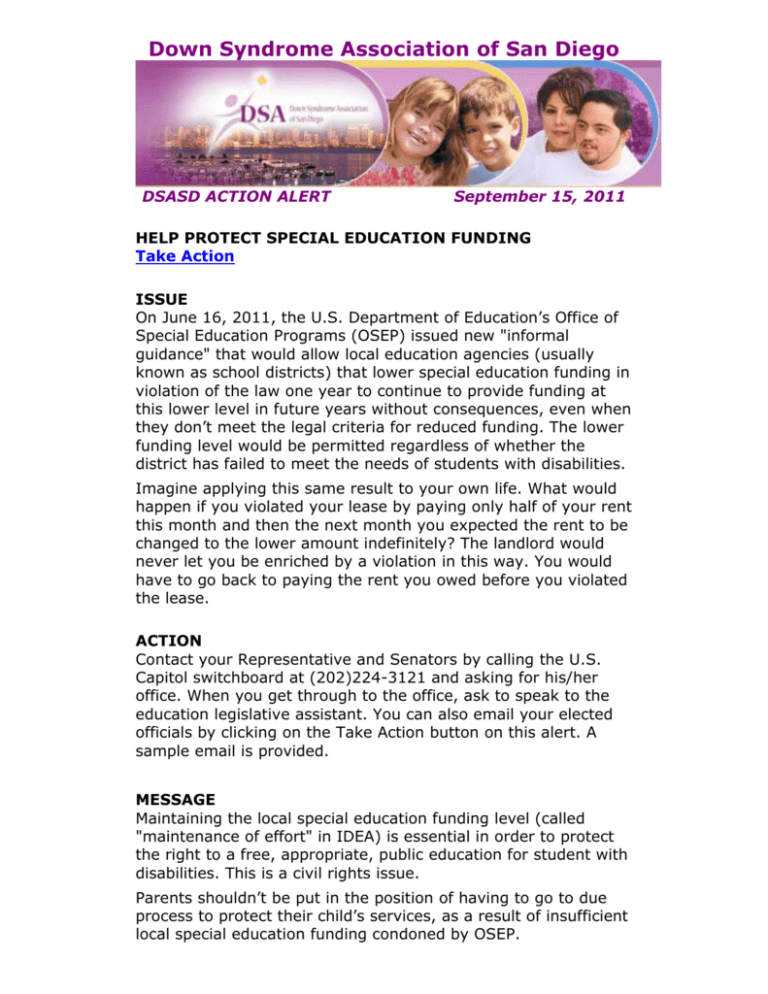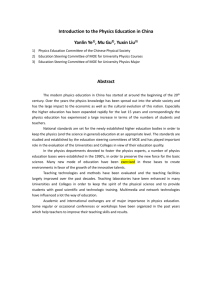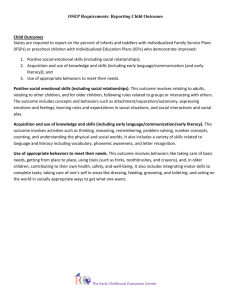Protect Sepcial Education Funding
advertisement

Down Syndrome Association of San Diego DSASD ACTION ALERT September 15, 2011 HELP PROTECT SPECIAL EDUCATION FUNDING Take Action ISSUE On June 16, 2011, the U.S. Department of Education’s Office of Special Education Programs (OSEP) issued new "informal guidance" that would allow local education agencies (usually known as school districts) that lower special education funding in violation of the law one year to continue to provide funding at this lower level in future years without consequences, even when they don’t meet the legal criteria for reduced funding. The lower funding level would be permitted regardless of whether the district has failed to meet the needs of students with disabilities. Imagine applying this same result to your own life. What would happen if you violated your lease by paying only half of your rent this month and then the next month you expected the rent to be changed to the lower amount indefinitely? The landlord would never let you be enriched by a violation in this way. You would have to go back to paying the rent you owed before you violated the lease. ACTION Contact your Representative and Senators by calling the U.S. Capitol switchboard at (202)224-3121 and asking for his/her office. When you get through to the office, ask to speak to the education legislative assistant. You can also email your elected officials by clicking on the Take Action button on this alert. A sample email is provided. MESSAGE Maintaining the local special education funding level (called "maintenance of effort" in IDEA) is essential in order to protect the right to a free, appropriate, public education for student with disabilities. This is a civil rights issue. Parents shouldn’t be put in the position of having to go to due process to protect their child’s services, as a result of insufficient local special education funding condoned by OSEP. States and districts that agree to take federal IDEA funds have an obligation not to cut local special education funding even when other budget cuts are made, unless they meet certain criteria in the law. We need our Members of Congress to call on the Secretary of Education to rescind this informal guidance and reinforce to states and local districts the standards they must follow to be eligible for federal funds under IDEA *It would be helpful to add a personal comment about how a student with disabilities in your life relies on special education funding or how services are hard to get even with the current funding levels. BACKGROUND The "informal guidance" issued by OSEP involves the "maintenance of effort" (MOE) requirement of the Individuals with Disabilities Education Act (IDEA). MOE, as it applies to local education agencies (LEAs-also known as school districts) means that districts have to provide at least the same level of local special education funding this year as they provided last year, as a condition of receiving federal IDEA funding. This new OSEP guidance would permit districts that lower special education funding this year below the amount from last year, in violation of the MOE requirement, to base next year’s education funding (and funding for future years) on the lower funding level that violated the law. Based on OSEP’s interpretation of the MOE requirement in the guidance, if a district is supposed to provide $1 million for special education funding in Year X (because that is what they provided the previous year) and the district violates this rule by only providing $500,000, then the new special education funding level for the year following Year X (and every year thereafter) would be $500,000, unless the district decides to raise it or violates the law again by lowering it further. In this example, OSEP would only consider the district to be in violation of IDEA in Year X even though funding will continue at the lower level for every year thereafter. The purpose of the MOE requirement (demonstrating maintenance of effort by maintaining the prior year’s funding level) is to ensure that all students with disabilities receive the special education services and supports they need for a free appropriate public education (FAPE). For that reason there are only two limited exceptions to the MOE requirement: (1) if the district’s expenses for that year have been legitimately reduced (e.g. by the natural turnover of senior highly paid staff for younger, but still qualified, lower paid staff) or (2) if the district receives additional federal funding. Special education funding for each year is supposed to be based on the amount of funding from the prior year to protect the students. Therefore, Congress could not have intended this to be the case when the funding level from the prior year violated the law. In addition this interpretation undermines the district monitoring provisions in IDEA because even districts with a poor record of meeting student’s needs would be permitted to maintain a lower spending level in the years following the MOE violation. ADDITIONAL RESOURCES The informal guidance by OSEP is at http://www.ideamoneywatch.com/docs/OSEP.Ltr.LEA.MOE.06.16 .11.pdf A letter to OSEP and legal analysis regarding this issue by the Center on Law and Education is at http://www.ideamoneywatch.com/docs/CLE_MOE_OSEP_LTR_08 .17.11.pdf NDSS National Policy Center advocacy@ndss.org http://capwiz.com/ndss/mlm/signup --------------------------------------------------------Forward to Family and Friends Down Syndrome Association of San Diego dsasd@projects.sdsu.edu DSAsdonline.org Text: Down Syndrome Association of San Diego DSASD e-NEWS September 15, 2011 HELP PROTECT SPECIAL EDUCATION FUNDING Take Action at http://capwiz.com/ndss/utr/1/MXGWQNRLPJ/KXZVQNRLSA/7333494366 ISSUE On June 16, 2011, the U.S. Department of Education’s Office of Special Education Programs (OSEP) issued new "informal guidance" that would allow local education agencies (usually known as school districts) that lower special education funding in violation of the law one year to continue to provide funding at this lower level in future years without consequences, even when they don’t meet the legal criteria for reduced funding. The lower funding level would be permitted regardless of whether the district has failed to meet the needs of students with disabilities. Imagine applying this same result to your own life. What would happen if you violated your lease by paying only half of your rent this month and then the next month you expected the rent to be changed to the lower amount indefinitely? The landlord would never let you be enriched by a violation in this way. You would have to go back to paying the rent you owed before you violated the lease. ACTION Contact your Representative and Senators by calling the U.S. Capitol switchboard at (202)224-3121 and asking for his/her office. When you get through to the office, ask to speak to the education legislative assistant. You can also email your elected officials by clicking on the Take Action button on this alert. A sample email is provided. MESSAGE Maintaining the local special education funding level (called "maintenance of effort" in IDEA) is essential in order to protect the right to a free, appropriate, public education for student with disabilities. This is a civil rights issue. Parents shouldn’t be put in the position of having to go to due process to protect their child’s services, as a result of insufficient local special education funding condoned by OSEP. States and districts that agree to take federal IDEA funds have an obligation not to cut local special education funding even when other budget cuts are made, unless they meet certain criteria in the law. We need our Members of Congress to call on the Secretary of Education to rescind this informal guidance and reinforce to states and local districts the standards they must follow to be eligible for federal funds under IDEA *It would be helpful to add a personal comment about how a student with disabilities in your life relies on special education funding or how services are hard to get even with the current funding levels. BACKGROUND The "informal guidance" issued by OSEP involves the "maintenance of effort" (MOE) requirement of the Individuals with Disabilities Education Act (IDEA). MOE, as it applies to local education agencies (LEAs-also known as school districts) means that districts have to provide at least the same level of local special education funding this year as they provided last year, as a condition of receiving federal IDEA funding. This new OSEP guidance would permit districts that lower special education funding this year below the amount from last year, in violation of the MOE requirement, to base next year’s education funding (and funding for future years) on the lower funding level that violated the law. Based on OSEP’s interpretation of the MOE requirement in the guidance, if a district is supposed to provide $1 million for special education funding in Year X (because that is what they provided the previous year) and the district violates this rule by only providing $500,000, then the new special education funding level for the year following Year X (and every year thereafter) would be $500,000, unless the district decides to raise it or violates the law again by lowering it further. In this example, OSEP would only consider the district to be in violation of IDEA in Year X even though funding will continue at the lower level for every year thereafter. The purpose of the MOE requirement (demonstrating maintenance of effort by maintaining the prior year’s funding level) is to ensure that all students with disabilities receive the special education services and supports they need for a free appropriate public education (FAPE). For that reason there are only two limited exceptions to the MOE requirement: (1) if the district’s expenses for that year have been legitimately reduced (e.g. by the natural turnover of senior highly paid staff for younger, but still qualified, lower paid staff) or (2) if the district receives additional federal funding. Special education funding for each year is supposed to be based on the amount of funding from the prior year to protect the students. Therefore, Congress could not have intended this to be the case when the funding level from the prior year violated the law. In addition this interpretation undermines the district monitoring provisions in IDEA because even districts with a poor record of meeting student’s needs would be permitted to maintain a lower spending level in the years following the MOE violation. ADDITIONAL RESOURCES The informal guidance by OSEP is at http://www.ideamoneywatch.com/docs/OSEP.Ltr.LEA.MOE.06.16.11.pdf A letter to OSEP and legal analysis regarding this issue by the Center on Law and Education is at http://www.ideamoneywatch.com/docs/CLE_MOE_OSEP_LTR_08.17.11.pdf NDSS National Policy Center advocacy@ndss.org http://capwiz.com/ndss/mlm/signup -------------------------------------------Forward to Family and Friends at http://www.dsasdonline.org/dsasd.cfm?pid=listserve_form Down Syndrome Association of San Diego dsasd@projects.sdsu.edu DSAsdonline.org





